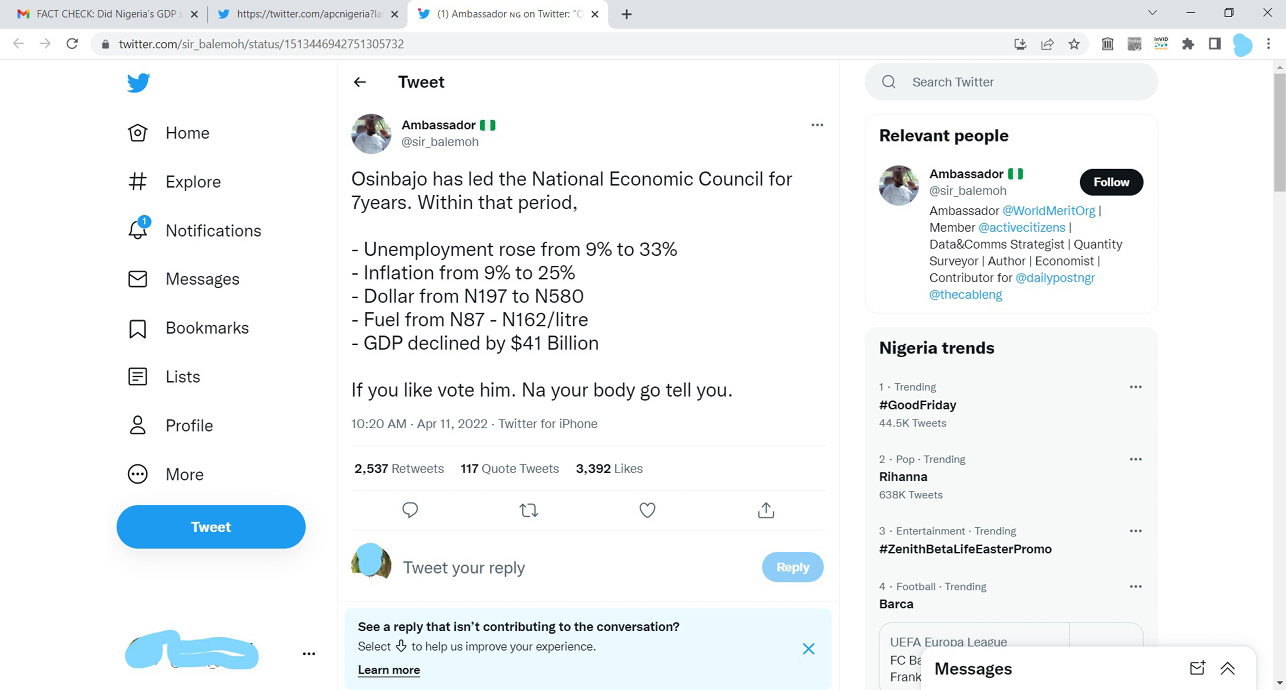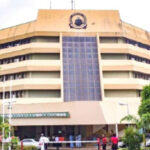Claim: A twitter user @sir_balemoh made a series of claims after the declaration of Vice President Yemi Osinbajo to run for presidency in 2023. Among the claims was that the present administration reduced the country’s GDP by $41 billion. He posted that: “Unemployment rose from 9% to 33%, dollar from N197 to N580, Inflation from 9% to 25%, fuel from N87-N162/litre, GDP declined by $41 billion. If you like vote him, na your body go tell you,” he said.
Verdict: Some of the claims are true while others are false.
Claim 1: Nigeria’s Gross Domestic Product (GDP) reduced by $41 billion since assumption of office by President Muhammadu Buhari.
Verdict: FALSE
Verification: A breakdown of GDP figures from the National Bureau of Statistics and the World Bank from 2015 to 2020 shows that Nigeria’s GDP in 2015 when President Buhari assumed office stood at $486bn, it then declined to $404bn when the country slipped into recession. In 2017, GDP figures further declined to $375bn. However, in 2018, as the economy began to recover, figures further improved to $397bn. In 2019, the figure surged to $448bn. By 2020, in the heat of the Covid-19 pandemic which affected virtually every sector of the world economy, GDP figures declined to $432bn. GDP figures have been estimated to rise to $40bn in 2021 with the 3.98 per cent growth of the economy even though official figures by the World Bank are still being expected.
Conclusion: The $41bn as stated by the user is not accurate as the GDP declined by $54bn from 2015 to 2020 as the official figures have shown. As such the claim is FALSE.
Claim 2: Dollar has risen from N197 to N580
Verdict: True
Verification: In 2015 when President Buhari assumed office, the dollar was exchanging for the naira at N198 at the parallel market, by 2018 it was N306 to the dollar, by 2019 it went up to N360 to the dollar and eventually got to N520 in 2021. From 2021 till date, the dollar at the parallel market is exchanging between N560 to N600.
Conclusion: The devaluation of the naira from 2015 till date has seen the dollar rise from 1$ to N198 in 2015 to $1 to between N560 to N600 in 2020.
Claim 3: Inflation from 9 to 25 %
Verdict: FALSE
Verification: Nigeria’s inflation rate in 2015 was a single digit of 9.01 per cent. A breakdown of inflation figures year on year showed that inflation rate at the end of 2015 was 9.01 per cent. In 2016, at the thick of recession, it skyrocketed to 15.68 per cent. In 2017, it further moved up to 16.52 per cent. It however slowed to 12.09 per cent in 2018 and later 11.40 in 2019.
It later rose to 15.75 per cent in December 2020 which is the highest recorded in the past three years. In 2021, inflation rate rose for the first time in eight months to 15.63 per cent, the reason was attributed to high yuletide spending.
Subsequently, the latest Consumer Price Index report by the National Bureau of Statistics indicated that Nigeria’s inflation rose to 15.7 per cent in February from 15.6 percent in January.
According to the NBS, the highest increases were recorded in prices of gas, liquid fuel, wine, tobacco, spirit, narcotics, and solid fuels among others.
The NBS had said, “In February 2022, the CPI which measures inflation increased to 15.70 per cent on year-on-year basis.”
Conclusion: Inflation rate was at 9.01 per cent at the end of 2015. However, the claim that it has now risen to 25 per cent is FALSE.
Claim 4: Unemployment rose from 9 to 33%
Verdict: MISLEADING
Verification: Nigeria’s unemployment rate at the last quarter of 2015 stood at 10.4 per cent according to the National Bureau of Statistics. The figure went up to 14.2 per cent at the end of 2016. At the end of 2017, it had moved up to 20.42 per cent. Later, it moved up to 23.1 per cent in 2018 and the latest figures from the NBS indicated that unemployment rate now stands at 33.3 per cent.
Conclusion: Contrary to the 9 per cent stated by the twitter user, Nigeria’s unemployment at the last quarter of 2015 stood at 10.44 per cent and not 9 per cent. However, it is true that the current unemployment rate is now 33.3 per cent.
Claim 5: Fuel from N97 to N162 per litre
Verdict: TRUE
Verification: Checks by Daily Trust has shown that fuel price stood at N87 per litre. As at May 2016, it had moved from N87 per litre to N145 per litre representing a 66 per cent increase. In 2020, it was further reviewed upwards to N162 per litre. In 2020, the product was sold between N165 per litre to N200 per litre at the various fuel stations in the country.
Conclusion: The claim that the price of petrol rose from N87 to N162 is true as that is what is obtainable across the country.

 Join Daily Trust WhatsApp Community For Quick Access To News and Happenings Around You.
Join Daily Trust WhatsApp Community For Quick Access To News and Happenings Around You.


